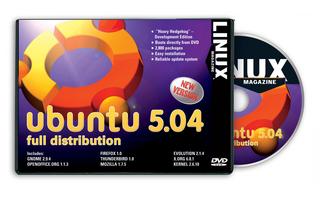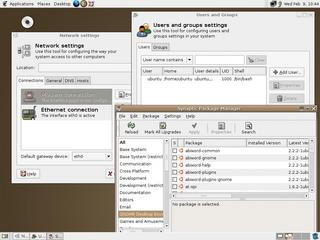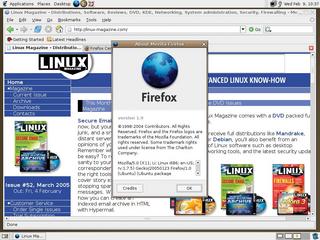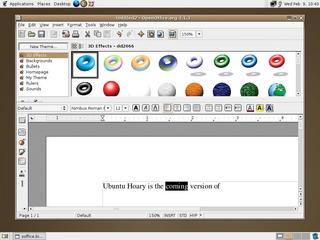Linux Magazine DVD

Linux Magazine DVD |

|
Ubuntu Linux is a stylish distribution built from Debian and polished for the corporate user. This month's DVD brings you a special pre-release of the upcoming Ubuntu Linux 5.04, which Ubuntu has dubbed the "Hoary Hedgehog" release.
Canonical Software developed Ubuntu with the goal of producing a free Linux distribution with the look and feel of a commercial product. Throughout Ubuntu, you'll find corporate style and efficiency interwoven with the stability and substance of Debian. Canonical's philosophy is enshrined in the Ubuntu manefesto, which states that "software should be available free of charge, that software tools should be usable by people in their local language and despite any disabilities, and that people should have the freedom to customize and alter their software in whatever way they see fit."
The business side of Ubuntu is reflected in the regular and predictable release schedule (a new release every six months) and in Ubuntu's fine and highly original graphical themes. Ubuntu also provides a variety of technical support packages for users and organizations who want access to expert advice. Options include the Standard package (US$ 100 per desktop or US$ 400 per server) and a Premium package (US$ 250 per desktop and US$ 700 per server). Ubuntu also offers technical support on a per-incident basis.

Canonical calls Debian "the rock upon which Ubuntu is built." Debian forms the core of the Ubuntu distribution. But rather than basing Ubuntu on the last major Debian release, the Ubuntu team strives to deliver a more up-to-date Debian than even Debian is delivering.
For every six month release, Ubuntu "freezes" a snapshot of the Debian development archive and works independently toward a final release. Because Ubuntu is smaller and doesn't support as many platforms as Debian, development can proceed more efficiently to a final version.
Any Debian code used by Ubuntu is free software released under the GPL, so the source code for any change Ubuntu makes is available to developers throughout the Linux community.

For clarity and efficiency, Ubuntu sorts and filters the vast collection of software available through Debian and other Linux sources. Ubuntu technical support is targeted to the applications that are used most often. The Ubuntu software respository is divided into four components:
The component system lets Canonical provide thorough support in core areas and still give users access to the full range of Debian-backed applications. In all, Ubuntu supports over 1,000 applications, and up to 10,000 Debian additional applications are available in the Universe repository through the Synaptic package management system.

| Ubuntu Bounties |
|
Ubuntu's unique blend of Open Source and business is best exemplified in its bounty system. Ubuntu offers cash bounties for programmers who contribute code in critical areas. The code will later become part of the free Ubuntu release. Bounties are currently available for target areas such as Python scripting and Mozilla error pages. Ubuntu welcomes other proposals for bounty projects. The Ubuntu bounty process: 1. Contact info@ubuntulinux.org with the summary of your bounty in the subject line. Establish which project you are interested in and your credentials. 2. Ubuntu usually has some public discussion on the ubuntu-developers mailing list or wiki to establish the exact specification. The community has a chance to review the bounty proposal, and this gives the project owners an opportunity to have their say on code that may be included in their work. 3. Submit a formal proposal, which will be published in the relevant forums. Others might submit competitive proposals. 4. Depending on the nature of the work, Ubuntu might make a commencement award to you to get you off the ground. 5. Specify your bounty completion date and keep the Ubuntu team informed on progress. 6. Once the code is accepted, to the satisfaction of people identified before you started (for example, the project owners, if the project involves work extending an existing project), Ubuntu pays the agreed bounty. 7. Bounties can and will expire. 8. The Ubuntu Community Council's decision is final. In the event there are several competing submissions for a bounty, all completed within a month of the first one, the council awards the bounty to the implementation it thinks is best. For more on Ubuntu's bounties, see http://www.ubuntulinux.org. |
Canonical takes great pride in the artistry of the graphics, themes, and color schemes provided with Ubuntu. The best art contributed by users is included in the release, and Canonical encourages artists within the community to exchange ideas and submit new themes. The Ubuntu website includes links to sites that display the work of Ubuntu artists.
Ubuntu Linux 5.04 comes with Linux kernel 2.6.10 and X.org 6.8.1. You'll also find the brand new Gnome 2.9.4 desktop, along with Open Office 1.1.3 and a collection of useful desktop and administration tools.
New with the Hoary Hedgehog release is a unified hardware detection system. Also debuting with this version of Ubuntu is support for the Kickstart automated installation. Kickstart lets you pre-configure installation choices such as disk partitions, mouse configurations, network configurations, and security options so you can install easily over the network.
The Linux Magazine Ubuntu 5.04 "Hoary Hedgehog" DVD is ready to use. Plug it in and start your system. You'll soon be exploring the tools, repositories, and elegant graphics of a truly innovative Linux distribution.
| Ubuntu 5.04 Highlights |
|
SystemLinux kernel 2.6.10 X.org 6.8.1
DesktopGnome 2.9.4 Firefox 1.0 GIMP 2.2 OpenOffice 1.1.3 Evolution 2.1.3.2 Nautilus 2.9
ProgrammingGCC 3.3.5 GlibC 2.3.2 Perl 5.8.4-5 Python 2.4 Ruby 1.8 PHP 4.3
System AdministrationNFS Apache CUPS Kerberos MySQL Postgres Mutt Nagios Squid Bind Postfix Shorewall Samba |